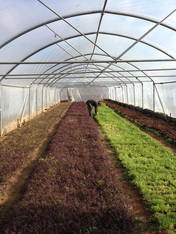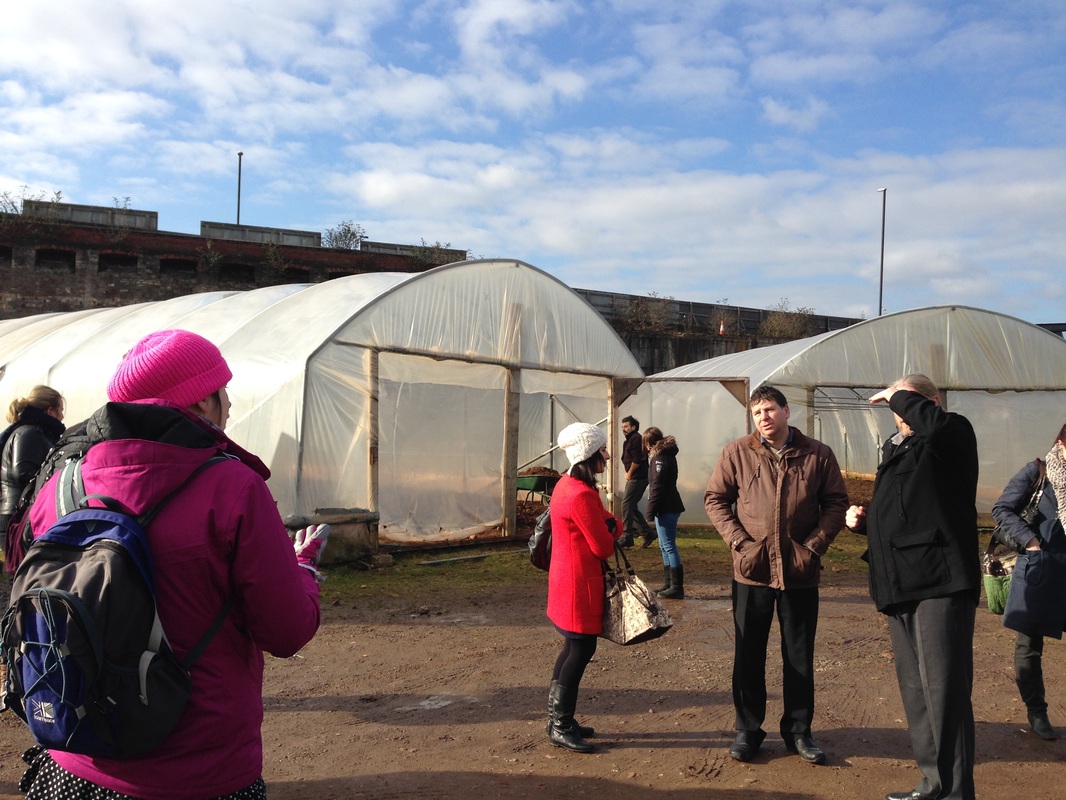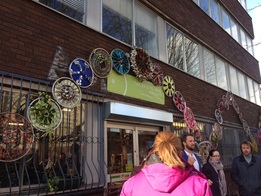On Friday I broke away from the office (aka my kitchen table) and off to Bristol to spend the day with some other UnLtd Award winners visiting some amazing and very successful Social Enterprises.
First stop was The Severn Project established by Steve Glover in 2010. The Severn Project is a social enterprise producing and supplying the highest quality salad to food-lovers across Bristol and beyond. Their urban farms are run by passionate individuals with track records in helping people from socially excluded groups, such as those recovering from substance misuse, with poor mental health or offending backgrounds.
Pip gave us an interesting insight into some of the challenges and successes that they had faced over the past few years which ranged from developing safe ways of growing organic produce on a brown field site through to the familiar challenge of funding and growth. The Severn Project pride themselves on growing a unique and exceptionally high quality product and this has been so successful that by the end of 2015 they plan to be growing a tonne of salad leaves a week. Next Benito gave us a tour of the poly tunnels and we even had the opportunity to try some of the delicious leaves. It was extremely cold outside and I was pleasantly surprised by the warmth inside the poly tunnels. I could have stayed all day!
First stop was The Severn Project established by Steve Glover in 2010. The Severn Project is a social enterprise producing and supplying the highest quality salad to food-lovers across Bristol and beyond. Their urban farms are run by passionate individuals with track records in helping people from socially excluded groups, such as those recovering from substance misuse, with poor mental health or offending backgrounds.
Pip gave us an interesting insight into some of the challenges and successes that they had faced over the past few years which ranged from developing safe ways of growing organic produce on a brown field site through to the familiar challenge of funding and growth. The Severn Project pride themselves on growing a unique and exceptionally high quality product and this has been so successful that by the end of 2015 they plan to be growing a tonne of salad leaves a week. Next Benito gave us a tour of the poly tunnels and we even had the opportunity to try some of the delicious leaves. It was extremely cold outside and I was pleasantly surprised by the warmth inside the poly tunnels. I could have stayed all day!
Next onto The Canteen based in Hamilton House for a much needed lunch. Founded in 2009 The Canteen provides “yummy food and drink from local suppliers, a relaxed space for affordable good times and top live music for free every night of the week”. It really is an amazing space full of amazing people – there is a Banksy by the front door!
They are serious about their food and have been awarded the Sustainable Restaurant Associations highest rating of three stars for their commitment to local and ethical suppliers and for their care of people and planet. 5% of their monthly net profit goes towards the well-being of their staff. Their values - inclusivity, accessibility, affordability, healthy eating and they always have a vegan and/or vegetarian option on the menu.
Over a bite to eat at The Canteen we met Jamie Pike Co-Founder of Coexist, based at Hamilton House. Hamilton House was a vacant and neglected office block for many years. In 2008 the owners, Connolly and Callaghan invited a group of friends (including Jamie) to create a centre for the community.
Ever since Coexist has been working hard to create a space in which the community can grow, share, collaborate, and learn what it is to live in coexistence with each other. It is an amazing space – a meld of community, creativity and though leadership.
A key part of Hamilton House is The Bristol Bike Project which came into being in the December of 2008 after project founders James Lucas and Colin Fan were inspired to set up a charitable bike project while cycling their way through Scandinavia. James was volunteering with Bristol Refugee Rights and began to understand the importance and need for disadvantaged and marginalised people to be independently mobile in our city. With ridiculously over-priced bus fares and our even more ridiculous reliance on the oil industry to fuel our cars, bicycles make perfect sense for navigating and living in an urban environment.
Today the bike project works with individuals from all walks of life, focusing on marginalised groups such as the Homeless, recovering Substance Misusers and youth groups. Amongst other things that offer maintenance courses, servicing and repair and bike hire and have also developed an “Earn A Book” scheme where people can get involved in repairing bikes and get to take one away at the end of the workshop! They run specific groups for women and young people aged 8-18.
They are serious about their food and have been awarded the Sustainable Restaurant Associations highest rating of three stars for their commitment to local and ethical suppliers and for their care of people and planet. 5% of their monthly net profit goes towards the well-being of their staff. Their values - inclusivity, accessibility, affordability, healthy eating and they always have a vegan and/or vegetarian option on the menu.
Over a bite to eat at The Canteen we met Jamie Pike Co-Founder of Coexist, based at Hamilton House. Hamilton House was a vacant and neglected office block for many years. In 2008 the owners, Connolly and Callaghan invited a group of friends (including Jamie) to create a centre for the community.
Ever since Coexist has been working hard to create a space in which the community can grow, share, collaborate, and learn what it is to live in coexistence with each other. It is an amazing space – a meld of community, creativity and though leadership.
A key part of Hamilton House is The Bristol Bike Project which came into being in the December of 2008 after project founders James Lucas and Colin Fan were inspired to set up a charitable bike project while cycling their way through Scandinavia. James was volunteering with Bristol Refugee Rights and began to understand the importance and need for disadvantaged and marginalised people to be independently mobile in our city. With ridiculously over-priced bus fares and our even more ridiculous reliance on the oil industry to fuel our cars, bicycles make perfect sense for navigating and living in an urban environment.
Today the bike project works with individuals from all walks of life, focusing on marginalised groups such as the Homeless, recovering Substance Misusers and youth groups. Amongst other things that offer maintenance courses, servicing and repair and bike hire and have also developed an “Earn A Book” scheme where people can get involved in repairing bikes and get to take one away at the end of the workshop! They run specific groups for women and young people aged 8-18.
There is nothing better than spending time with people who have been there, done it and in this case grown the salad! Thank you to everyone who took the time to share their insight and best practice - it really is invaluable.




 RSS Feed
RSS Feed
